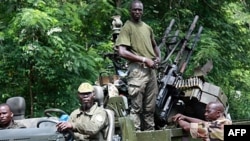Four months after its successful presidential runoff election, Cote d'Ivoire is at a political and humanitarian crossroads. The small West African nation is gripped by turmoil as two men claim the presidency in an increasingly violent struggle that has split the country in two and threatens to destabilize its neighbors.
Last year's election was free and fair, and the nation's Independent Electoral Commission ruled that Alassane Ouattara is the nation's democratically elected leader. The incumbent president, Laurent Gbagbo, is refusing to accept the results, however, and has loosed his supporters and security forces on those pressing for new leadership. The world's leading exporter of cocoa and once one of Africa's post-colonial success stories, the nation has all but come to an economic standstill amid the standoff, with banks closed, businesses struggling and workers missing their pay.
Two paths lie before the country in the days ahead.
One is where Gbagbo and his supporters continue to cling to power, inflicting ever more violence on innocent civilians, and diplomatic and economic isolation on themselves.
The other path leads Gbagbo to follow the example of leaders who reject violence and abide by the will of the people. Where Ivorians reclaim their country and rebuild a vibrant economy that was once the admiration of Africa.
It is a choice that must be made, one for all Ivorians, not just Gbagbo.
The United States remains committed to finding a peaceful resolution to the crisis that has gripped Cote d'Ivoire. We are working closely with the African Union and Economic Community of West African States to achieve an orderly transition of power from Gbagbo to the internationally recognized president, Allasane Ouattara. We have done this through supporting the United Nations peacekeeping mission there, imposing economic sanctions on Gbagbo and his close circle, and through consultations with Cote d'Ivoire's neighbors and others in the international community.
The nation has a proud past, from gaining independence to overcoming civil war. Ivorians deserve leaders who can restore their rightful place in the world and realize a proud future.
Seeking Peace in Cote d'Ivoire

Cote d'Ivoire is at a political and humanitarian crossroads.












